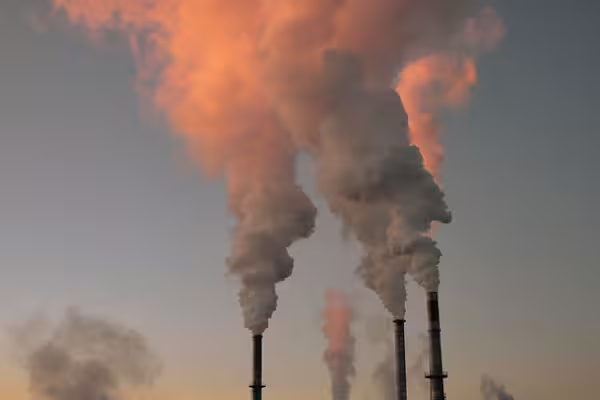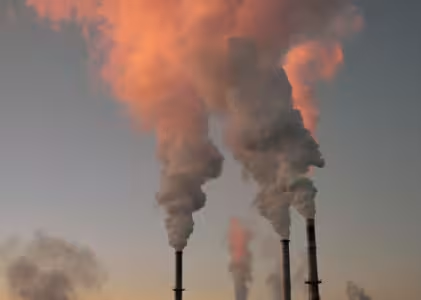How Air Pollution Affects Human Health – Imagine this: every time you breathe, it’s a pernicious attack against your body, weakening the lungs and damaging the heart, even having an impact on the brain. You cannot see it; it’s there: air pollution. It’s one of those dangers that are so easy to ignore because it doesn’t have any immediate effect but, over time, is devastating.
I’m not here to freak you out for no reason, but just trust me- you gotta know what happens with your body because of the air outside. One will engage in discussions, through this paper, on precisely how air pollution affects human health, why one should be concerned, and what one is capable of doing to protect oneself and loved ones. You owe it to yourself to read this, as the consequences of not knowing can be life-altering.
How Air Pollution Affects Human Health
What Is Air Pollution?
Let me explain in detail. By “air pollution,” I mean any harmful elements in the form of chemicals, particulate matter, and biological material that accidentally enter the air. Also, pollutants from industrial factories, car emissions, burning fossil fuels, and even common household products contribute to air pollution. Once in the air, we inhale them without our knowledge. Scary, right? The worst part is that air pollution does not choose its target; it affects all persons including yourself, irrespective of your residence.
How Does Air Pollution Affect Human Health?
1. Respiratory System
The lungs are the first target of impure air. During inhalation, tiny pollutants and toxic gases travel deep inside the lungs and immediately begin to cause irritation and long-term damage.
- Asthma and Bronchitis: Do you ever feel out of breath after being outdoors on a smoggy day? Well, that is no accident. Air pollution often worsens asthma and bronchitis.
- COPD is a respiratory disease that one quite frankly cannot develop without long-term exposure to poor air quality, possibly leading to permanent destruction of lung tissue.
- Lung Cancer: Probably the most frightening thing is that some air pollutants have long-term exposure linked to lung cancer, one of the deadliest diseases in the world. It might even get worse since the damage could occur while one is still unaware.
2. Cardiovascular System
Think your heart couldn’t be touched by something as intangible as air? Well, here it is: air pollution can be just as dangerous to your heart as to your lungs.
- Heart Diseases: Air pollution inflames the blood vessels too, which raises again the rate of heart attack and stroke, along with causing hypertension.
- High Blood Pressure: Those tiny particles in polluted air may even go as far as entering your bloodstream and causing high blood pressure, which puts you at risk for heart complications.
3. Brain and Cognitive Function
What if I told you that air pollution could mess with your brain? Shocking, I know, but recent research has indeed pulled out a shocking connection between air pollution and cognitive decline.
- Dementia and Alzheimer’s: Long-term exposure to air pollution accelerates the risk of dementia and Alzheimer’s. Respiration of fine particles inflames and causes oxidative stress, thereby damaging the brain cells.
- Mood and Mental Health: It is not about physical health only; air pollution can mess with your mind too. Well, there does seem to be some evidence that links the bad quality of air to depression and anxiety.
Expert View: Air Pollution and Health
Dr. Jane Martin is an environmental health specialist, and for over twenty years she has been involved in air pollution-related research. She maintains, “One cannot talk enough about how air pollution affects human health. It is a silent killer, mainly among children and the elderly. Respiratory diseases, cardiovascular issues, and cognitive decline are all rising at alarming rates-and it’s all linked to poor air quality.
As Dr. Alan Smith, a cardiologist, put it, “People often don’t think about air pollution when they think about the development of risk factors for heart disease. But in cities experiencing truly incredibly high levels of pollution, we are finding rates of heart attack comparable to patients with high cholesterol or hypertension.”
Case Study: The London Smog of 1952
Now, to emphatically and cohesively press the issue, one of the most infamous cases of lethal air pollution has got to be the Great Smog of London back in 1952. Coal burning combined with stagnant weather conditions was responsible for a thick layer of smog oriented within the city in a matter of days.
By the time that smog had cleared, it was estimated that 12,000 people had died and over 100,000 were experiencing respiratory problems. It was this tragedy that brought recognition of just how serious air pollution can be in relation to health; it caused reforms to air quality laws. But, as we will see, this remains a problem today.
Frequently Asked Questions (FAQs)
1. Does air pollution impact children differently?
Yes, of course. Children are very susceptible to air pollution since their lungs are still growing. This can be very dangerous and might lead to imperfect growth of the lungs, creation of asthma, and even increased susceptibility to respiratory infections.
2. How will I protect myself against air pollution?
You can decrease the amount of exposure by reading air quality reports, avoiding doing outdoor activities when pollution levels are high, using indoor air purifiers, and wearing masks when pollutant concentration is forecast to be high.
3. Does air pollution affect indoor air quality?
Yes, air pollution can enter your home through windows and doors. Household activities like cooking and using cleaning products are contributing factors to indoor air pollution.
4. What You Can Do to Protect Yourself
Okay, I’ve hit you with a load of scary information, but there’s hope. There are ways you can protect yourself and reduce your exposure to polluted air.
- Get Current Information: Pay attention to air quality forecasts; stay inside when pollutant levels are high, if possible.
- Buy an Air Purifier: Buying a good air purifier for your house can surely be a great investment, primarily if you live in an urban area.
- Wear Your Mask: It may not be cool, but seriously, in highly polluted areas, wearing masks makes the mask filter out a lot of harmful particles.
- On the macro level, support clean energy initiatives and do all you can to reduce your carbon footprint, bring down the overall pollution in the air.
More From Us
The Role of Wetlands In Flood Prevention
Effects of Deforestation on Biodiversity
How to Implement Sustainable Practices in Urban Planning
Breakthroughs in Wave Energy harvesting
Conclusion on How Air Pollution Affects Human Health
If there is anything that I want to highlight in this article, then that will be-air pollution is one silent threat to your health. From the lungs down to the heart, it may even spread through the brain-which may just cause polluted air to damage your body irreversibly.
These may not seem so obvious, but these, over time, add up and become fatal. Still, it is not too late to act. Whether making personal changes or galvanizing for cleaner air policies, every little bit helps.
The air we breathe is a gift- let it not turn out to be the silent killer in your life.


